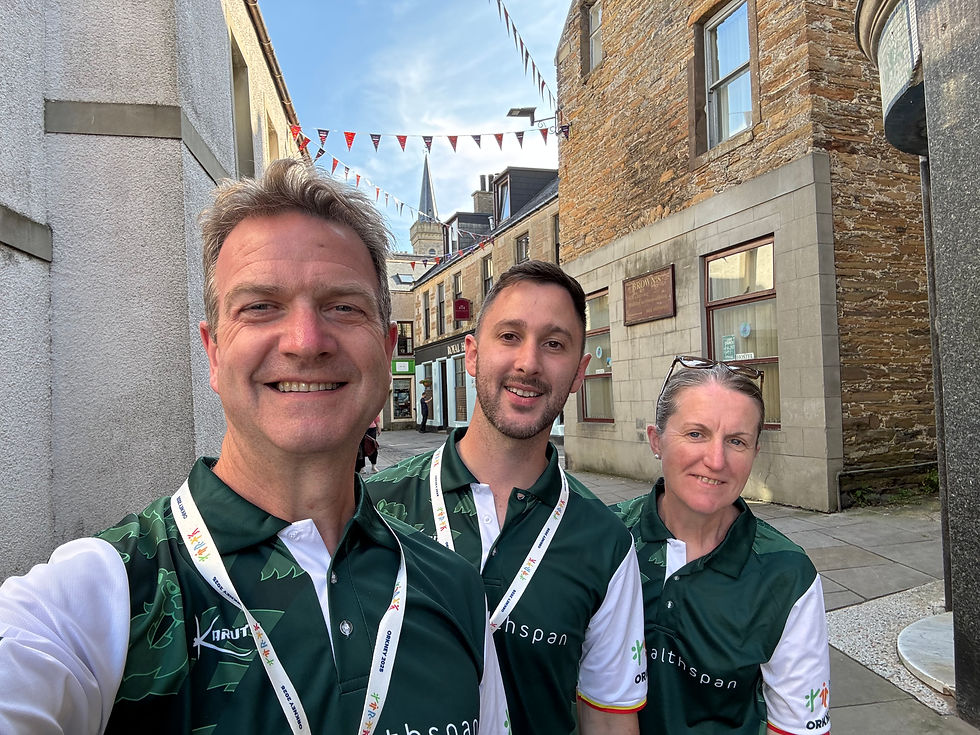Island Games: Reflections from Orkney
- Jul 24, 2025
- 4 min read

Dr Nick Dunn returned from Orkney on Saturday with the Guernsey Island Games team, after spending the week working as team doctor alongside Dan Bihet from Edge Osteopathy and Clare Mannion from Guernsey Therapy Group.
Here Dr Nick reflects on what it took to keep Team Guernsey healthy and competition ready throughout the week:
Multidisciplinary working
Although there is a lot of cross-over with the people and conditions we manage, doctors, osteopaths and physiotherapists are trained in different ways and therefore look at the same problem from different angles. I was fortunate to be working with clinicians who were open to new ideas and happy to share their insights and experience. With shared values of confidentiality and patient-centredness we could at times use our different perspectives on a clinical problem or get advice from each other which would often provide a refreshing take on things to grow our clinical understanding and ensure athletes had the best treatment.
Preparation and planning
The three of us had meetings in advance of the games to plan schedules, consider what equipment we required, how we would get it there and how we could best meet the needs of the athletes and team managers. We have been reflecting together on lessons learned from Orkney and are already considering how to best prepare and improve for the games in the Faroes in two years’ time.
Adaptability and Flexibility
Working alongside athletes on the field and in a relatively alien environment required us to be creative and flexible on a daily basis. Practical challenges such as finding a room to use as a clinic first had to be addressed, and this alone required some bridge-building and negotiation with the medical organisers when we arrived. As we were all living across a wide area, some in Stromness and others in Kirkwall, which are 14 miles apart, we had to find an effective way to allow team managers to book athletes in for attention, and be available at times which worked around the various sports events. Our problem-solving skills were certainly put to the test, and there were times when athletes had to assessed on-site at the sports track, roadside or swimming pool with very limited facilities.
Communication
At a range of levels, communication was key to our role. We quickly gelled as a medic team, and with a bit of good humour found that we could be direct and honest with each other when required. We were fortunate to be well supported by the GIGA committee and had good communication with them and the team managers, which allowed us to share information while protecting individual athlete confidentiality. At the Games we were working alongside clinicians from Orkney but also other islands and parts of the UK, from a number of professional backgrounds and having a good working relationship in the polyclinic was important but also educational. I have made connections with some clinicians already which I hope to maintain in the run-up to the Faroes Island Games, with the hope of working collaboratively when the time comes.
Finally communication with the athletes themselves had to be clear, with us using our listening skills carefully to fully understand the issues, and also pick up on non-verbal signs and signals as it is thought that around 70% of communication occurs without words.
Holistic approach
Our role as Guernsey team medics had a wider role to all the athletes, not just those who required direct attention. Psychology and confidence in high performance sport can make the difference to winning, achieving personal bests or even breaking records. I was impressed by the holistic approach shown to athletes when they were being treated by my colleagues and I was reminded how important it is to understand the person and their surroundings when asked to manage a clinical problem. In addition I like to think that the athletes generally felt supported and confident that we were on hand should a problem arise.
Generosity
A recurring theme throughout the Games was the generosity of all those involved. There were over 1000 volunteers across the island, many of whom had travelled to be there, who had given their own time along with the rest of us, to support the Games in various ways. We were fortunate to have our own drivers, Eileen, Dave and Robbie, who patiently ferried us from place to place the whole week, and countless others gave up their time to make the Games a success. All the clinicians I worked with were happy to share resources, experience and time to create a positive working environment. Spending time with the managers and coaches I was struck by how much time they contribute throughout the year to support the athletes, directly and indirectly. It is said that in giving we receive, and there was definitely a sense that volunteering brings its own rewards.
The whole experience of being part of Team Guernsey at the Orkney Island Games will stay with me for a long time and it was a privilege to feel part of this, especially given the successes of the athletes. Working outside our usual environments forces us to look again at how and why we do certain things, and I will certainly take some of this learning back to my normal working practice. As our understanding of the impact of physical activity and exercise on health grows, the significance of the “ripple effect” of the Island Games on the health of the island will hopefully be appreciated and supported.



Comments